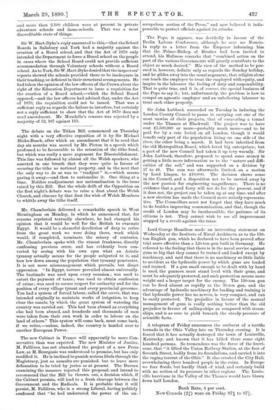On Tuesday night, Mr. Mundella moved a censure on the
Education Department for not acting with more promptitude and decision in forcing a Board school on the cities of Salis- bury and York, where the existing School Boards had not provided sufficient school accommodation in accordance with the requirements of the Act of 1870. The odd part of the speech was that while Mr. Mundella censured the Department, he exempted from censure not only the present Vice-President, Sir W. Hart-Dyke, but the permanent heads of the Department, speaking very cordially not only of Sir Francis Sandford and Mr. Cumin, but even of the new permanent head, Mr. Kekewich. Apparently, therefore, his censure must have been directed against the President of the Council, Lord Cranbrook, though he did not say that he was the great offender. At Salisbury, the charge was that the Bishop had resisted the establishment of any Board school as a matter of principle, and had pledged himself to find the money necessary for providing the fresh accommodation; but the Bishop did not propose to secure schools with low fees, and with a fee of 9d. a week and the grant of the Department, it was easy enough for the schools to pay their way without any substantial aid from voluntary subscriptions. With a. 9d. fee, working men had to go to the Guardians of the Poor to pay their fees, and it was absurd to permit elementary schools in Salisbury to charge 9d. a week. The case of 'York was still worse. Not only were the fees exceptionally high, but many of the schoolrooms were structurally unfit for the children crowded into them. The School 'Board there had accepted the offer of the Church Extension Association to provide the accommodation for which they were responsible,
and more than 2,100 children were at present in private adventure schools and dame-schools. That was a most discreditable state of things.







































 Previous page
Previous page